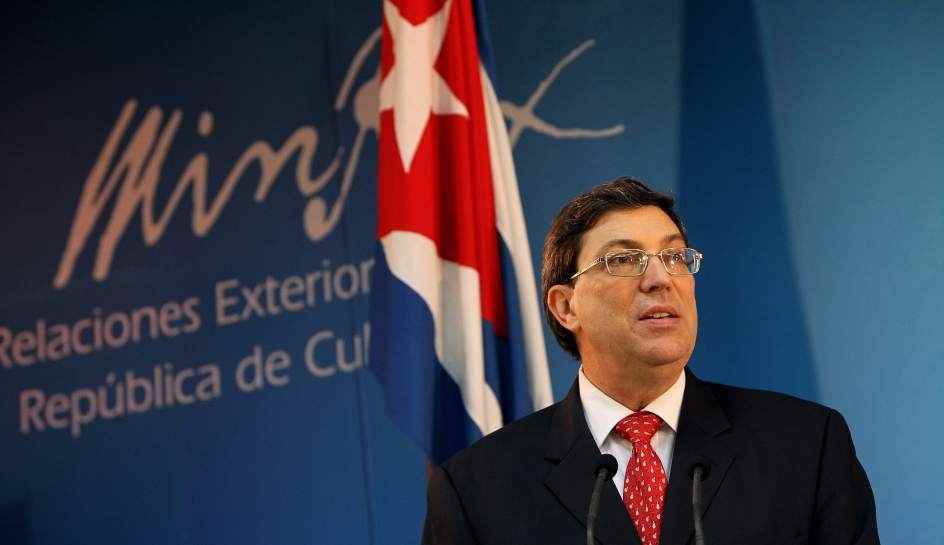
Cuba backs Venezuela, states position bluntly on big issues
Cuban Foreign Minister Bruno Rodríguez Parrilla on Thursday (March 6) denounced what he called a plot by the Venezuelan right wing and the United States to overthrow the government of President Nicolás Maduro.
During a press conference after his return from Caracas, where he attended a memorial for the late President Hugo Chávez, Rodríguez said that forces in Washington “are carrying out subversive operations intended to attack and degrade [the Venezuelan government’s] morale and its political, psychological, economic and military strength, its cohesion and effectiveness, and to distance it from the population, undermining its power by claiming that it is incapable of governing effectively.”
Washington’s plan also seeks “to divide the population and generate discontent, influence or create leaders and unify them ideologically, utilize the Émigrés, provoke catalyzing events and create favorable conditions for [U.S.] intervention through the use of propaganda, boycott and sabotage” and leading to “a popular uprising against the presidential palace to overthrow the government.”
“Can the U.S. and NATO guarantee that the use of force and these concepts of unconventional war […] are not being applied today against Venezuela, Cuba and other countries of Latin America and the Caribbean?” Rodríguez asked.
Referring directly to his own country and indirectly to the Cuban dissidents, the minister said that “those who hallucinate with the success in Cuba of these forms of war and its paid domestic agents, will run into a Revolution that knows how to defend itself with the power and sovereignty that, as its main achievement, our people exercise.”
Rodríguez repeated that “Venezuela has the right to defend its independence and sovereignty,” in response to the violence witnessed in recent street disturbances.
“We express our unwavering and full solidarity to the Bolivarian Republic of Venezuela and its constitutional President Maduro, to the government and the political-military leadership of the Revolution in the face of foreign interference,” Rodríguez said, “especially by the United States, the attempts to violently overthrow the government elected legitimately in a democratic manner, the deeds staged by fascist groups that have provoked deaths, injuries and destruction; the sabotage, economic aggression and campaigns of the transnational press.”
Alluding to the Cuban doctors and other advisers currently serving in Venezuela, the minister said that “the Cuban collaborators will continue to give their contribution to the well-being of the Venezuelan people and will fulfill their duty under any circumstances.”
“We forcefully condemn the resolution adopted by the [U.S.] House of Representatives and the one introduced in the Senate of the United States about Venezuela and the intromission of the OAS [Organization of American States,]” he said.
The latter was a reference to H.R. 488, approved Tuesday by the House. It condemns the government of Venezuela for the “inexcusable violence perpetrated against opposition leaders and protesters […] and the growing efforts to use politically motivated criminal charges to intimidate the country’s political opposition.”
The resolution is nonbinding. A similar bill is before the Senate.
Also, Rodríguez asked Washington to stop intervening in situation in Ukraine, because the United States’ stance could bring “very grave consequences for peace and international security.”
“There can be no acceptance of the violent overthrow of an institutional government at the cost of people killed and wounded by the intervention of the United States and some of its NATO allies,” he said.
“History will place the responsibility on the United States and its allies for the consequences of a military doctrine that’s increasingly offensive outside the boundaries of the North Atlantic Treaty, that threatens the sovereignty and independence of all states and constitutes a flagrant violation of international law and the United Nations Charter.”
With regard to the European Union’s invitation to begin negotiations with Cuba on an accord on political dialogue and cooperation, Rodríguez said that “Cuba welcomes with satisfaction this proposal, made on Feb. 10 by the High Representative [Catherine Ashton], which means the end of the unilateral policies toward Cuba and agrees to initiate negotiations to this effect, as we have just informed the E.U. ambassador in Havana.”
[Photo above is of Cuban Foreign Minister Bruno Rodríguez Parrilla. Photo published by the Spanish website ’20 Minutos’ from EFE.]

